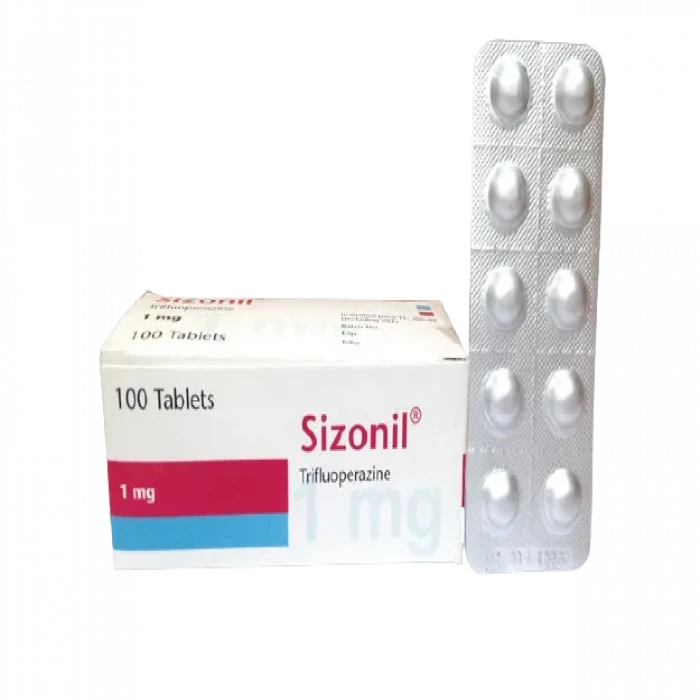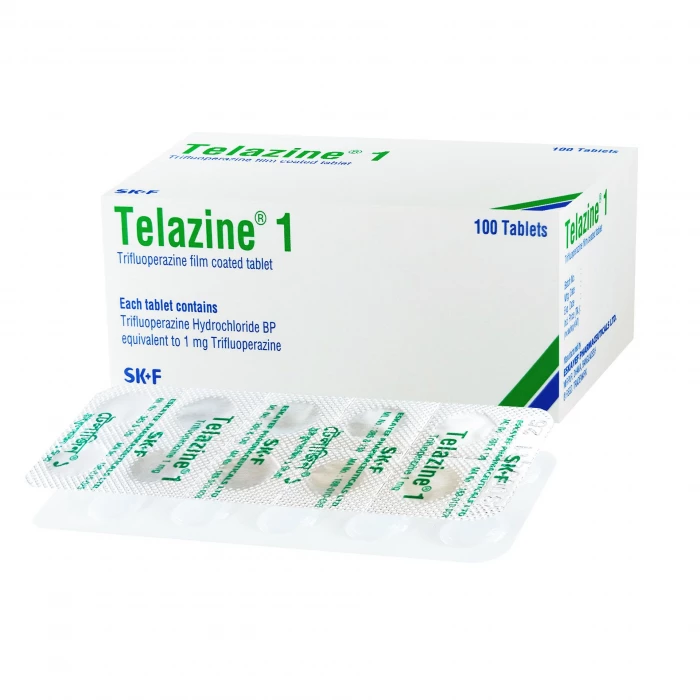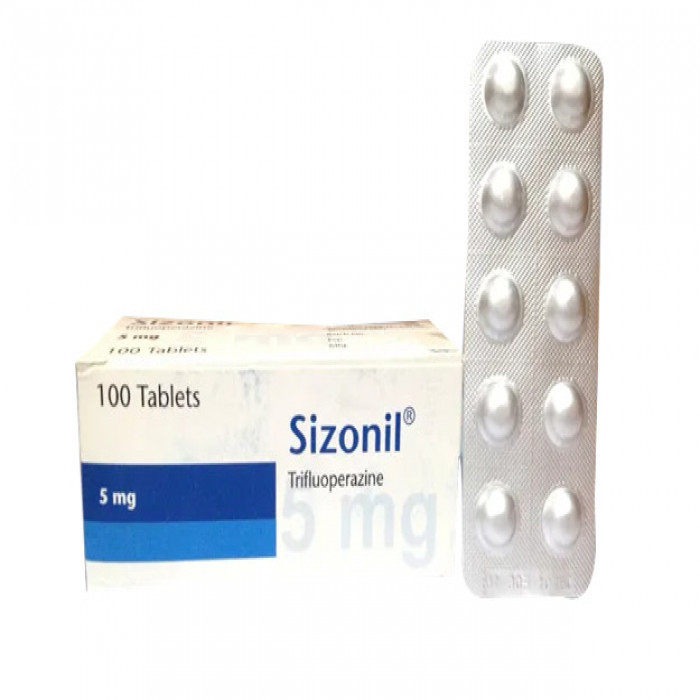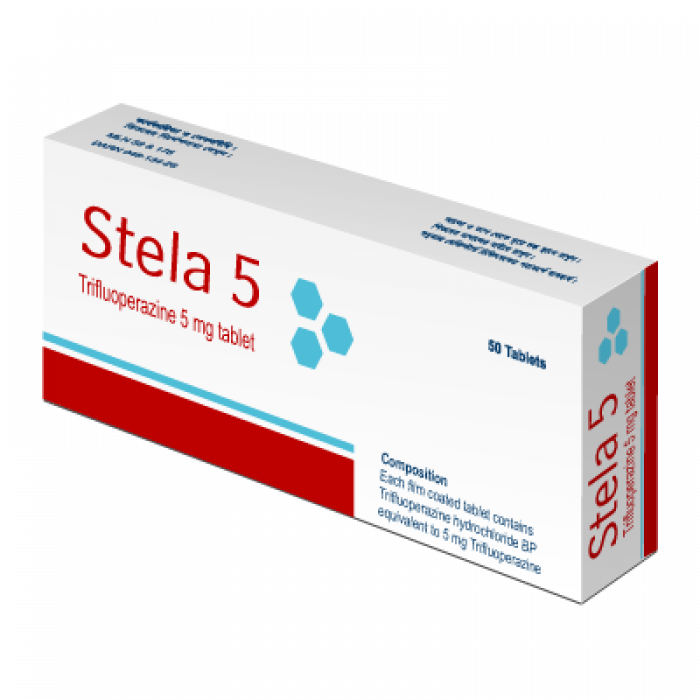
✔ 100% Authentic Product
👁️ Currently Viewing 2488
Sizonil 1mg Tablet 10pcs
Trifluoperazine is used to manage excessive anxiety, tension, and agitation in neuroses or somatic conditions. It also treats nausea and vomiting of various causes and psychotic disorders like schizophrenia.
📄Prescription Required
Discount
Price: ৳ 19
MRP:
৳
20
5%
Off

100% Genuine Products, Guaranteed

Safe & Secure Payments, Always

Fast, Secure & Efficient Delivery

Proper Packaging
 Cash on Delivery - All over Bangladesh
Cash on Delivery - All over Bangladesh Regular Delivery - 12-24 Hours, Dhaka City* Charge Tk.39-59
Regular Delivery - 12-24 Hours, Dhaka City* Charge Tk.39-59 Regular Delivery - 24-48 Hours, Other Cities* Charge Tk.99-110
Regular Delivery - 24-48 Hours, Other Cities* Charge Tk.99-110
🌙 রমযান অফার 🌙
 ফ্রি ডেলিভারিঃ - ৭৯৯ টাকা+ অর্ডারে, ঢাকা
শহরে
ফ্রি ডেলিভারিঃ - ৭৯৯ টাকা+ অর্ডারে, ঢাকা
শহরে ফ্রি ডেলিভারিঃ - ২৭৯৯ টাকা+ অর্ডারে, ঢাকার
বাহিরে
ফ্রি ডেলিভারিঃ - ২৭৯৯ টাকা+ অর্ডারে, ঢাকার
বাহিরে
📲 মোবাইল অ্যাপ অর্ডারে সাশ্রয় বেশী
-
Google Play Store থেকে ডাউনলোড
-
Apple Store থেকে ডাউনলোড
100% Genuine Products, Guaranteed
Safe & Secure Payments, Always
Fast, Secure & Efficient Delivery
Proper Packaging
 Cash on Delivery - All over Bangladesh
Cash on Delivery - All over Bangladesh Regular Delivery - 12-24 Hours, Dhaka City* Charge Tk.39-59
Regular Delivery - 12-24 Hours, Dhaka City* Charge Tk.39-59 Regular Delivery - 24-48 Hours, Other Cities* Charge Tk.99-110
Regular Delivery - 24-48 Hours, Other Cities* Charge Tk.99-110 ফ্রি ডেলিভারিঃ - ৭৯৯ টাকা+ অর্ডারে, ঢাকা
শহরে
ফ্রি ডেলিভারিঃ - ৭৯৯ টাকা+ অর্ডারে, ঢাকা
শহরে ফ্রি ডেলিভারিঃ - ২৭৯৯ টাকা+ অর্ডারে, ঢাকার
বাহিরে
ফ্রি ডেলিভারিঃ - ২৭৯৯ টাকা+ অর্ডারে, ঢাকার
বাহিরে- Google Play Store থেকে ডাউনলোড
- Apple Store থেকে ডাউনলোড
🌙 রমযান অফার 🌙
📲 মোবাইল অ্যাপ অর্ডারে সাশ্রয় বেশী
✅ Description:
Sizonil 1mg Tablet is prescribed to address schizophrenia, a neurological condition impacting a person's cognition, emotions, and behavior. Symptoms include delusions, hallucinations, apathy, and speech difficulties. Additionally, it's used to manage anxiety, marked by feelings of unease, nervousness, fear, and persistent worry.
Safety Advices

Alcohol
UNSAFE
Consumption of alcohol is not recommended during treatment with this medicine due to the increased risk of severe adverse effects such as confusion, dizziness, nausea, vomiting, weakness, fainting, etc. It is advised that you do not perform any activities that require high mental alertness such as driving a vehicle or operating machinery if you consume alcohol while taking this medicine.

Pregnancy
UNSAFE
Sizonil 1 is not recommended for use in pregnant women unless necessary. All the risks and benefits should be discussed with the doctor before taking this medicine.

Breastfeeding
UNSAFE
Sizonil 1 is not recommended for use in breastfeeding women unless absolutely necessary. All the risks and benefits should be discussed with the doctor before taking this medicine. Your doctor may advise you to discontinue breastfeeding or to discontinue the drug based on your clinical condition.

Driving
UNSAFE
Use of Sizonil 1 may cause symptoms such as dizziness, blurred vision, confusion, drowsiness, etc. in some patients. It is advised that you do not perform any activities that require high mental alertness such as driving a vehicle or operating machinery if you experience any of these symptoms during treatment with this medicine.

Kidney
CONSULT YOUR DOCTOR
Sizonil 1 should be used with extreme caution in patients suffering from kidney diseases due to the increased risk of worsening the patient's condition. Close monitoring of kidney function is necessary while receiving this medicine. Appropriate dose adjustments or replacement with a suitable alternative may be required in some cases based on the clinical condition of the patient.

Liver
CONSULT YOUR DOCTOR
Sizonil 1 should be used with extreme caution in patients suffering from liver diseases due to the increased risk of worsening the patient's condition. Close monitoring of liver function is necessary while receiving this medicine. Appropriate dose adjustments or replacement with a suitable alternative may be required in some cases based on the clinical condition of the patient.
✔️ Uses of Sizonil 1mg Tablet
- Anxiety Disorder
- Schizophrenia.
✔️ How does Sizonil 1mg Tablet work?
Trifluoperazine, the active component of Sizonil 1, blocks dopamine D2 receptors in the brain, exerting weak anticholinergic and sedative effects alongside strong extrapyramidal and antiemetic effects.
✔️ Side Effects of Sizonil 1mg Tablet
Common side effects include restlessness, dystonias, drowsiness, dizziness, and blurred vision. Peripheral edema, blood dyscrasias, and jaundice may rarely occur.
✔️ Quick Suggestions:
- Inform your doctor of thyroid or kidney issues, epilepsy, Parkinson's disease, glaucoma, or heart conditions before taking Sizonil 1.
- To maintain consistent medication levels, it's advised to take Sizonil 1 with food at the same time daily, adhering strictly to the prescribed dosage and duration.
- If a dose is missed, it should be taken promptly, and abrupt discontinuation without medical consultation can worsen symptoms.
- Avoid alcohol and sedatives during treatment, and manage weight gain through a balanced diet and regular exercise.
- Uses of Sizonil 1 include treating anxiety disorders and schizophrenia, while side effects may include orthostatic hypotension, drowsiness, dry mouth, abnormal movements, weight gain, increased prolactin levels, urinary retention, constipation, muscle stiffness, and tremors.
✔️ Pharmacology:
Trifluoperazine, belonging to the phenothiazine class, primarily acts by blocking dopamine receptors in the central nervous system (CNS), which underlies its antipsychotic and antiemetic effects.
✔️ Dosage & Administration of Sizonil 1mg Tablet
For schizophrenia and psychoses, adults typically start with 2-5 mg twice daily, with gradual increases. Children aged 6-12 start with 1 mg twice daily. For severe anxiety, adults may take 1-2 mg twice daily, while children aged 3-12 have adjusted doses based on weight and symptoms. Elderly patients start with reduced doses.
✔️ Interaction
Trifluoperazine may interact with drugs like oral anticoagulants, propranolol, and CNS depressants, altering their effects.
✔️ Contraindications
Avoid trifluoperazine in comatose patients, those with blood dyscrasias or liver damage, or hypersensitivity to the drug.
✔️ Pregnancy & Lactation
Its safety during pregnancy is not established, so use during pregnancy should be carefully considered. Limited data are available regarding its use during lactation.
✔️ Precautions & Warnings
Caution is advised when treating elderly patients or those with cardiovascular disease. Careful monitoring for extrapyramidal effects and hypotension is necessary.
Overdose symptoms mainly involve extrapyramidal effects and hypotension. Treatment includes supportive measures and managing symptoms. Anticholinergic drugs can be used for extrapyramidal symptoms, and fluid replacement for hypotension.
✔️ Storage Conditions:
Store trifluoperazine at room temperature, away from light and moisture.
⚠️Disclaimer:
At ePharma, we’re committed to providing accurate and accessible health information. However, all content is intended for informational purposes only and should not replace medical advice from a qualified physician. Please consult your healthcare provider for personalized guidance. We aim to support, not substitute, the doctor-patient relationship.









